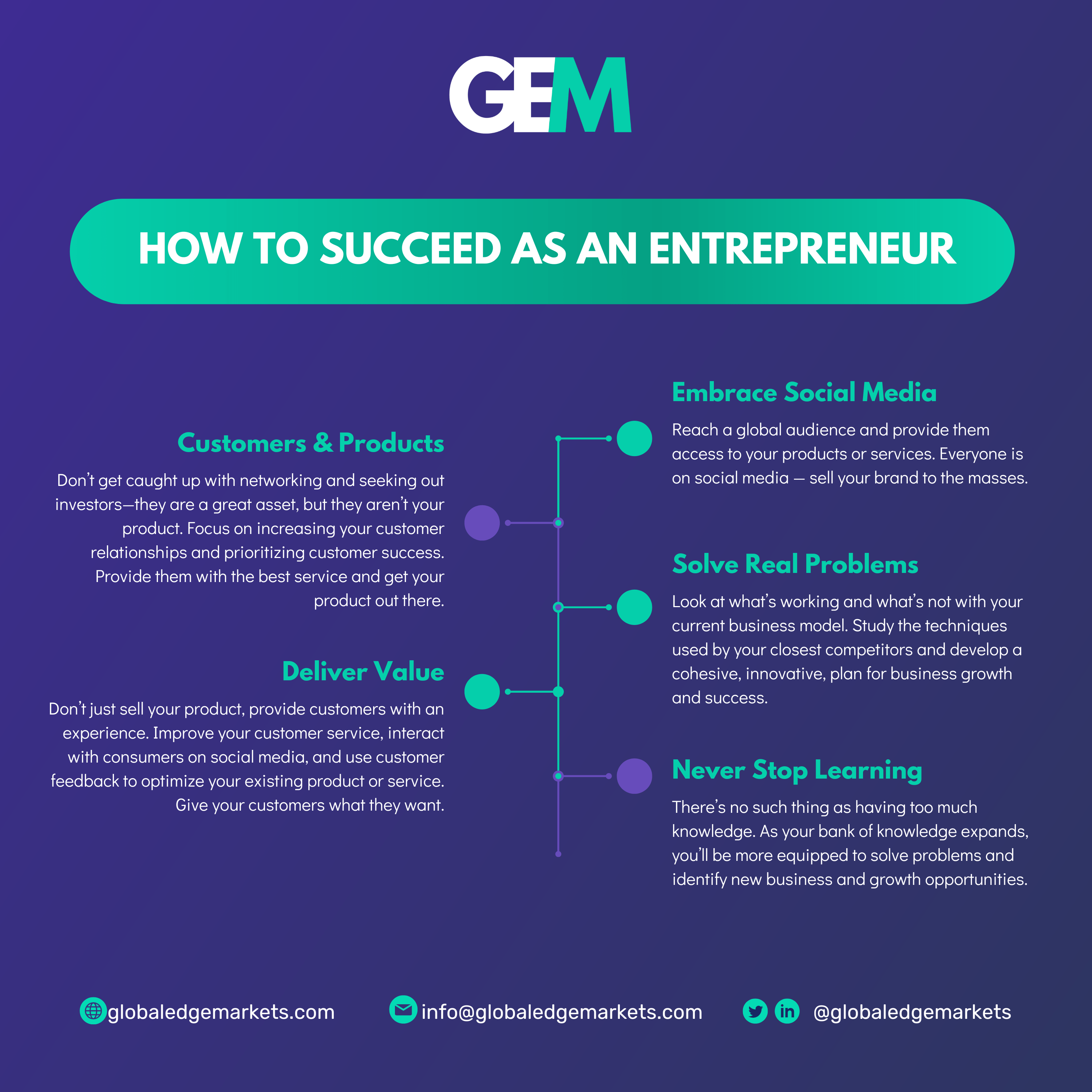There are several habits that successful entrepreneurs have in common. Those habits and approaches give them the drive, determination, and grit to achieve success. We asked our podcast guests about what they do to reach the top and celebrate their entrepreneurship.
Accept meetings
Networking is one of the keys to business development. However, managers often focus only on those meetings that are precisely related to their business. Successful entrepreneurs know that sometimes the best opportunities to diversify an existing or start a new business can happen where you do not expect them.
Therefore, it is extremely important to find time to communicate with people of different professions, different thoughts. Sleem Hasan, the CEO, and founder of Privity, shares his experience which taught him to be open to new meetings and people.
Today if somebody knocks on my door and is referred through a friend if it's even totally unrelated to what I'm doing, I will take that meeting. I never say no to the first cup of coffee with anybody. Never turn your nose up because you just never know.
Sleem Hasan, CEO & Founder of Privity Tweet
Listen to the episode:
Listen
We tend to value speaking over listening, especially among leaders and founders, who are often typecast as extroverted, outgoing mavericks. We admire people who can clearly express what they’re thinking the moment it crosses their minds. While entrepreneurs are open to new meetings and surround themselves with a variety of thoughts, ideas, and mindsets, the skill of listening is crucial for learning, understanding people’s needs,and building lasting relationships with people who feel understood and validated.
The CEO and founder of Ziotag, Jeffrey Paul emphasized the importance of listening in improving your own skillset.
Listen three times as much as you talk, because nobody ever learned anything by talking, you learn by listening.
Jeffrey Paul, CEO & Founder of Ziotag Tweet
Listen to the episode:
At the same time, successful entrepreneurs know that there is no endpoint in developing their listening and understanding skills. Kate Gaffin, founder of Human to Human Selling, agreed that people should listen with the intent to understand.
A lot of deep listening and letting people talk. A lot of people have a hard time listening. They're not listening, they're too busy thinking about what they're going to say when the other person stops talking. So that's a skill I think we can all get a little bit better at.
Kate Gaffin, Founder of Human to Human Selling Tweet
Listen to the episode:
Find a Mentor
For entrepreneurs, every day represents a new challenge, a new problem, which they have to solve. But at the beginning of their journey, all entrepreneurs are inexperienced inlaunching their business or solving specific struggles they face. At that point that’s important to find a mentor, a person whose experience you can draw on. Mentoring experienced entrepreneurs can skyrocket business and teach you how to deal with situations you come across.
Zuzana Dobro, who is the founder of The WHO Method, recommends finding a person you trust who can become a role model, share valuable experience, guide you along the career path, and simply give motivation and inspiration.
If you are curious knowing how certain people actually achieve certain things or do certain things, then reach out to them. Find a mentor, find a coach in an area that you really want to learn. That person can always provide a different perspective, different experience, different advice.
Zuzana Dobro, Founder of The WHO Method Tweet
Listen to the episode:
Travel More
Besides being a lot of fun and relax, travel can be an essential part of an entrepreneur’s development. Travel helps develop important business characteristics and enhances the entrepreneur’s problem-solving abilities. Getting outside of your comfort zone whether it’s your office or hometown will be beneficial for your mental, emotional, and physical health which prevents burnout at work and let you enjoy doing business and implementing new projects.
Vadim Perelman is a famous Hollywood director and producer, who despite active work in the industry of entertainment always finds a moment to escape from the comfort zone to seek inspiration and new perspectives.
I wish a lot of people would have the ability to move, the ability not to become stagnant, just see new opportunities, to see how the same things are perceived in different countries. It gives me a lot of material, a lot of perspectives.
Vadim Perelman, Hollywood director & producer Tweet
Listen to the episode:
Exercise
Entrepreneurs are those people who always demand the most from themselves and fully dedicate time for their passion, their business. In such a case, it is not easy to integrate sport and hobbies into a tight schedule. However, it’s vital for entrepreneurs’ physical and mental health to maintain an ongoing exercise regimen even despite the practical limitations in doing so.
Exercising also enhances creativity, memory, and overall cognitive skills. Many studies suggest that the parts of the brain that control thinking and memory are larger in people who exercise than in people who don’t.
Audra Shallal is the founder and Managing Director of an International Strategic Management Firm stresses the existence of considerable interactions between exercising and improving your entrepreneurial skills.
For me, sports and hobbies that you're passionate about are so intertwined with your career, and your job, and professional life. Keeping that balance is important because one plays into the other.
Audra Shallal, Managing Director of an International Strategic Management Firm Tweet
Listen to the episode:
Not caring about the age
There are several different stereotypes about the age of entrepreneurs. Some people imagine entrepreneurs as young persons in their early 20s to mid-30s, college-educated, passionate, and hungry for success.
On the other hand, a study published in the Harvard Business Review by MIT Sloan School of Management in the US, states that the average age of a successful startup founder is 45.However, the fact is the age matters less when it comes to entrepreneurship, where the most valuable features are dedication, passion, solutive ideas.
There are numerous examples of successful entrepreneurs of different ages: Marc Zuckerberg started Facebook in 2004 from his college dorm and became the world’s youngest self-made billionaire by the age of 23, meanwhile Bernard Marcus co-founded a little company called Home Depot when he was 50 years old. He is now worth an estimated $5.8B, just to name a few.
Jon Ferrara, the founder, and CEO of Nimble, through his own experience, shows that there is no age limit for the entrepreneurial soul.
I started my first company when I was 28, and I started my second company when I was 51. And in between that time, I took 10 years off to raise three babies. And I think that there is no age to limit yourself to starting a business, whether you're young or whether you're older.
Jon Ferrara, Founder & CEO of Nimble Tweet
Listen to the episode:
Making mistakes
It may seem cliché that mistakes are still a wise teacher to anyone willing to become better in the particular field of occupation. However, there are numerous new entrepreneurs who are afraid of failing and making mistakes, which is mostly caused by applying the wrong approach in dealing with mistakes. An average person would apply a blaming approach which kills their time and teaches nothing.
At the same time, with the problem-solving approach entrepreneurs assume, stopping to evaluate where and why things went sideways leads to new insights and, possibly, stronger relationships with those involved. The founder of the Scale Up Ecosystems, Daniel Isenberg, claims that mistakes are a crucial part of our life and we can benefit from making those.
Making mistakes is normal. If you don't want to make mistakes, don't get out of bed in the morning.
Daniel Isenberg, Founder of Scale Up Ecosystems Tweet
Listen to the episode:
Jay Samit, the former Independent Vice Chairman of Deloitte, and the author of the bestseller ‘DisruptYou!’, confirms the idea of the correspondence of making mistakes in personal and professional lives.
We have no fear of failure, and failing is so important. It's a part of the process, look at a little one-year-old toddler, show me a kid that learned to walk without falling down repeatedly.
Jay Samit, author of "DisruptYou!" Tweet
Listen to the episode:
Solving Problems
Entrepreneurs like no others are endowed with the ability to identify and solve problems. As the founder of an organization or the leader of the team, successful entrepreneurs are constantly facing various obstacles and problems, and the problem-solving talent or skill cultivated over years of experience helps them successfully find vital solutions.
Gil Petersil, co-owner of a group of companies MeetPartners, networking mastery coach, summarized the main features of entrepreneurs, which distinguishes them from other professionals.
An entrepreneur is not someone who's necessarily taking one business in stable and growing into a corporation. Entrepreneur is really someone who's identifying problems out there in the world, who talks to a lot of different people and finds out what challenges they are having. An entrepreneur is someone who gets passionate about finding solutions.
Gil Petersil, Networking Coach Tweet
Listen to the episode:
Michimasa Naka, Deputy President and Head of Global Investor Sales for Citigroup Global Markets Japan Inc, stressed the importance of constant self-control in solving problems.
You have to be very creative and always think, what am I doing? Is that necessary? Is that something people want? That's how innovation comes and we always have to look for the solutions.
Michimasa Naka, Head of Global Investor Sales for Citigroup Japan Tweet
Listen to the episode:
Discovering new perspectives
In order to develop their business, entrepreneurs are constantly in search of fresh ideas, ways of development, and sources of inspiration. They know that the ability to look at a problem from different perspectives helps to choose the best option for its successful solution.
Farzana Baduel, the founder and CEO of Curzon PR, recommends discovering the thoughts of different people, and checking the information in the press reading international perspectives on the same topic.
You have to actively be conscious of ensuring that you immerse yourself with a diversity of people across, not just race, and gender, and socioeconomic, but the diversity of thought. I like to read the Guardian, the State News of Iran. I want to know global perspectives, even if they are in direct opposition to the core beliefs that I have, I want to learn.
Farzana Baduel, Founder and CEO of Curzon PR Tweet
Listen to the episode:
Surrounding yourself with right people
Successful entrepreneurs understand that having the same driven and hard-working people as they are can accelerate success. Those people share your goal-oriented approach to business and help you reach any target more effectively and efficiently.
Wendy Tong, the CEO, and Founder of Wendy’s Team emphasized the significance of surroundingyourself with the right and dedicated people.
I don't need to take anything off my plate, at least for now. The secret behind that is having delegates, having lieutenants in every area of my life that I can trust and who are, first of all, aligned with my vision, who are very aligned with what I want and what is the outcome. And so that they can put into action, whatever needs to be in place for that aligned outcome.
Wendy Tong, Founder & CEO of Wendy's Team Tweet
Listen to the episode:
David Mathison is the CEO and founder of the CDO Club and CDO Summit, author of the Be The Media relying on his many years of experience listed the main characteristics of the people he is willing to work with.
'm not looking at profitability, I’m not looking at profits over people, quite the opposite. The people that I choose to work with me need to show loyalty, consistency, dedication, passion, they need to build beyond what's expected, and I pick my employees that way, that I don't need to micromanage my employees.
David Mathison, CEO & Founder of the CDO Club & CDO Summit Tweet
Listen to the episode:
Staying Confident
This is an undisputed fact that in the entrepreneurial world confidence is an integral part of success. However, when you’re just starting out, it can be hard to have confidence as an entrepreneur. You’re probably
worried that everything won’t work out. Even if you have a great product, idea, or solution, without confidence in the success toolbox that value you could bring to the world is almost sure to go unseen.
Jennifer Spencer, Software Engineer at NASA Goddard Space Flight Center, recommends, first of all, identify your strengths, find your vision of success.
You have to be able to be confident in who you are, and what you want, and what you believe, and know that if you're doing a good job and you're being careful and you're doing the right thing, that's enough. You must tell yourself what you can be and cannot be. That's a hard voice to find, but find it, speak it and keep going.
Jennifer Spencer, Software Engineer at NASA Goddard Space Flight Center Tweet
Listen to the episode:
Melinda Emerson as a founder and president of Quintessence Group shares the advice to be confident in your words, not being afraid or shy to set high goals.
You have to make sure that you have a good story to tell about yourself and what you really want to do. Whenever young people try to interview me, I always ask, what's your big picture? What do you want to do? You need to make sure that you can articulate. Better say ‘I want to be a director one day, or I want to be a CMO one day, or I want to own my own business.’ Then that's something I can work with.
Melinda Emerson, Founder & President of Quintessence Group Tweet
Listen to the episode:
Constantly learning
Some entrepreneurs may think that once they’ve achieved a certain level of success, secured a few big profits, the hard work is done, and they have enough experience and stability. In fact, successful entrepreneurs know that this is just the beginning of the journey, and to stay on the top, you have to constantly invest in yourself. It can be acquiring new education, learning a new language, getting interested in new branches of science, etc.
Constant learning is the concept of always expanding your knowledge to gain new skills and expertise. Stimulating the brain with the continual learning of new information enhances the cognitive ability of the individual, and increases problem-solving ability and memory.
Gil Petersil is co-owner of a group of companies MeetPartners, networking mastery coach, he says that constant learning is a vital activity for successful entrepreneurs.
I believe having one job for too long, where you get too comfortable is not human enough. As humans we must work our bodies, our bodies must be flexible. You've got to work out your mind and you got to study different things, adjust yourself, and pick up new skills, and pick up new talents as you go through life.
Gil Petersil, Networking Coach Tweet
Listen to the episode:

Conclusion
In conclusion, the habits of successful entrepreneurs are key factors that enable them to achieve their goals and maintain their success over the long term. Through discipline, perseverance, adaptability, and a willingness to take risks, these entrepreneurs are able to navigate challenges and seize opportunities. By developing a growth mindset and consistently prioritizing their goals, successful entrepreneurs are able to stay focused and motivated, even in the face of setbacks.
Whether it’s maintaining a daily routine, building a strong network of mentors and advisors, or constantly learning and improving, the habits of successful entrepreneurs provide valuable insights into the mindset and behaviors necessary to achieve success in business and in life.





